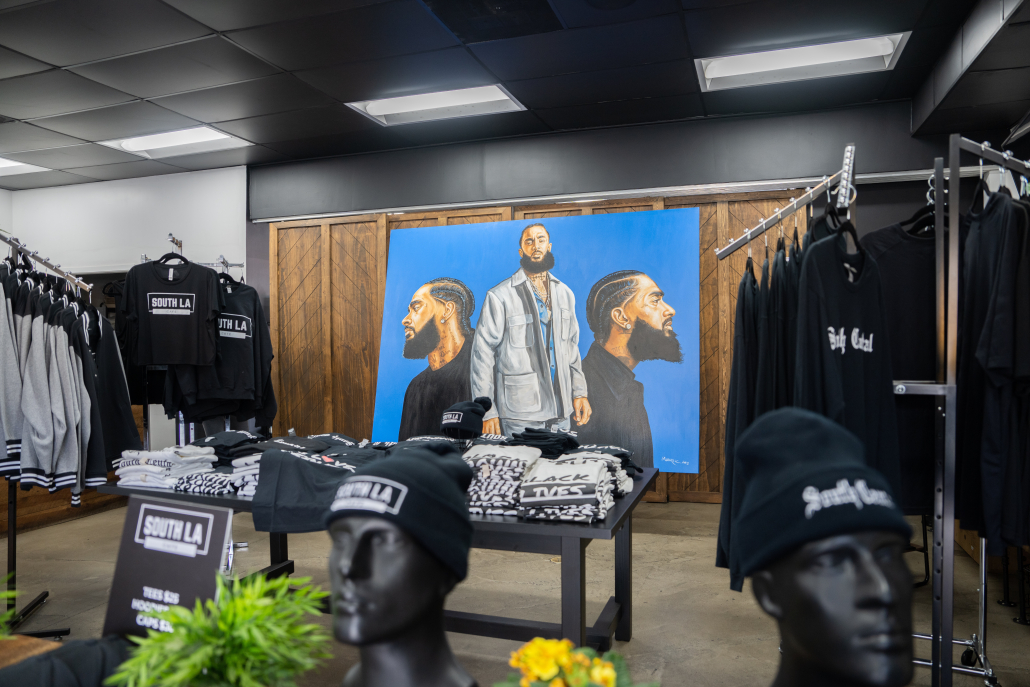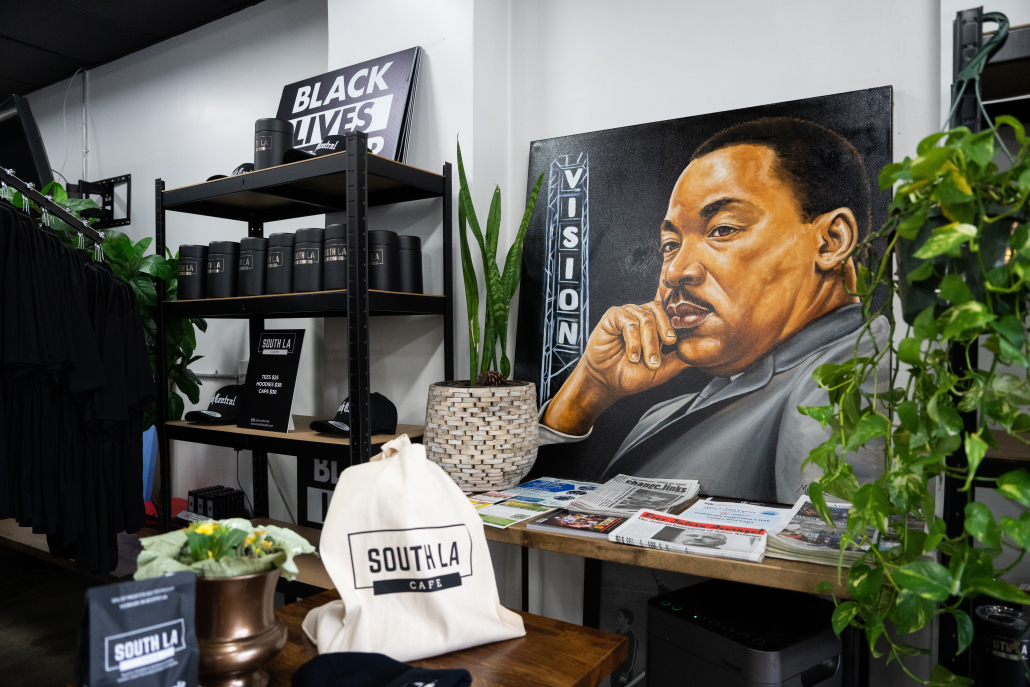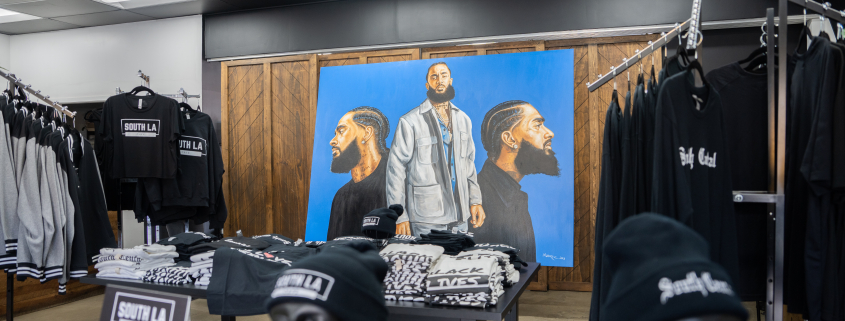South Central cafe fights food insecurity, gentrification

This article is the first in the Daily Trojan news section’s expansion into coverage of South L.A. The Daily Trojan has not, in the past, dedicated coverage to news from the neighborhoods surrounding USC’s University Park Campus. We are making this change to better serve the greater community in which USC is situated and to inform USC community members about issues that extend past USC’s gates.
The interior of the South LA Cafe is divided in half by a towering painting of Nipsey Hussle, the late rapper, entrepreneur and activist. On one side, customers order house-made coffee, pastries and avocado toast; On the other side, volunteers prepare dozens of tote bags filled with free groceries to give to the local community each Wednesday.
The South LA Cafe is a Black-owned cafe that opened in December 2019. Its founders, husband and wife duo Joe and Celia Ward-Wallace, created the cafe to address racial, social, economic and food inequity by selling food at affordable prices and creating job opportunities to invest back into the community.
Joe Ward-Wallace is an administrator for the Los Angeles Fire Department, entrepreneur and real estate agent. Anita Lopez, who has been receiving free groceries from the cafe for two years, said that Ward-Wallace has a kindness with which he receives visitors to the cafe.
“[Joe] has a very kind heart,” Lopez said. “I’ve seen people come in here and they get mad and they have an attitude. And he’s able to talk to them. He doesn’t yell … and I feel that not a lot of people have that gift.”
Celia Ward-Wallace is a business consultant, entrepreneur and longtime social justice advocate. She brought her own experience with racial justice to the cafe — passed on from her parents, both lifelong political advocates — along with her expertise in building businesses with an impact.
“Celia definitely drops gems every day,” said Petra McMoore, a South LA Cafe employee, about the mentorship that Ward-Wallace provides for staff members.
The cafe’s mission is to address food insecurity — the inaccessibility of healthy, fresh food — which is a major issue in South Central that disproportionately affects marginalized groups. A 2022 study, jointly conducted by the Dornsife College of Letters, Arts and Sciences and the Keck School of Medicine, found that 24.3% of L.A. County residents were food insecure in 2022, the majority of which identified as Hispanic or Latine. With a lack of affordable, healthy food options, people who experience food insecurity are forced to choose fast food and other cheaper, yet less healthy options, according to a study published by the L.A. County Department of Public Health. Often, this results in diet-related chronic conditions such as obesity, high blood pressure and heart disease, among others, according to the same study.
I’ve been to other food banks and it’s not the same. Other places are like, “OK, you’re just here, in and out, bye.” But not [at the South LA Cafe]: They don’t make you feel ashamed that you’re coming here because you’re less fortunate or you don’t have the funds to have the food on your table.
Anita Lopez, groceries recipient at South LA Cafe
Jennifer Johns, a local musician, food justice advocate and daily patron of the South LA Cafe, said she believes access to healthy food is critical in addressing challenges like the school-to-prison pipeline — a national trend in which harsh school policies, such as zero-tolerance discipline, leads students into the criminal justice system which disproportionately affects Black students, according to the American Civil Liberties Union.
“One of the major components to education, or the ability to retain information and education, is about nutrition or your access to real nutrition,” Johns said. “If we’re looking at how we want to stop the cycle of violence in our communities, and we want to stop the cycle of sending people to prison … access to real food is absolutely the very first step.”
Though the South LA Cafe began as a cafe, it soon expanded its operations to host open mic nights, live events, podcast recording sessions and much more support the local community. The Ward-Wallaces also launched an affordable grocery store called the South LA Market.
The South LA Cafe opened a second location at Kaiser Permanente Baldwin Hills Crenshaw in October and recently announced a partnership to contribute to catering, a new cafe and a new restaurant for the L.A. Natural History Museum.
The presence of a community-led, community-driven business in South Central becomes increasingly important as more longtime residents are priced-out of the region and the makeup of the community continues to change due to gentrification. A study by the UCLA Urban Displacement Project found that the number of gentrified census tracts in L.A. County increased by 16% between 1990 and 2015, and the trend shows little signs of stopping.

“[South LA Cafe] became the heartbeat of this particular thoroughfare because there’s a Starbucks pretty much within a mile of where we are. And if you go towards USC, there’s literally three Starbucks in between a quarter mile,” said Damon Turner, founder of Trap Heals — a company focused on investment in the community through arts and culture — and daily patron of the cafe. “So, to be able to have a community-led, community-driven cafe right here in the middle of Western and King, I think it just really opened up an opportunity not only to be able to hire locally, but for folks who buy coffee to get some really good coffee.”
By the time the coronavirus pandemic began spreading in early 2020, the South LA Cafe changed once again, introducing Grocery Giveaways. Each Wednesday, hundreds of people in need from the local community receive a tote bag filled with free healthy groceries — carrots, potatoes, tortillas, chicken and much more.
After losing two loved ones during the pandemic and suffering from a decreased income, the grocery giveaways meant everything to Lopez, but she said the impact extends beyond having food on the table.
“I’ve been to other food banks and it’s not the same,” Lopez said. “Other places are like, ‘OK, you’re just here, in and out, bye.’ But not [at the South LA Cafe]: They don’t make you feel ashamed that you’re coming here because you’re less fortunate or you don’t have the funds to have the food on your table.”
Johns and Turner said they visited the South LA Cafe each day for almost an entire year, partially to satisfy Johns’ “chai addiction,” but to enjoy the community as well.
“It’s like Cheers; everybody knows your name,” Johns said. “If I come in here without [Turner], they’re asking about him. If he comes in here without me, they’re asking about me. It’s a community.”

